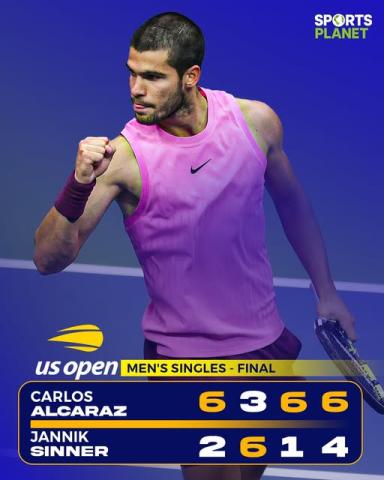
NEW YORK – The final, thunderous forehand landed flush on the line. The roar of Arthur Ashe Stadium became a singular, deafening wave of sound. But for Carlos Alcaraz, in that pristine, perfect moment, the world fell silent. He dropped his racket, fell onto his back on the hard blue canvas, and covered his face with his hands. These were not just tears of joy; they were tears of release, the physical manifestation of a monumental mental and physical burden finally, gloriously, lifted.
Carlos Alcaraz is once again the US Open champion and the World No. 1. But this 2025 victory over his eternal rival, Jannik Sinner, was about so much more than a trophy or a ranking. It was a victory of the soul. It was the day the prodigy became a pantheon-level legend, securing a place in history that few ever reach.
The Weight of History
The statistic now echoes through the annals of tennis history: by defeating Sinner, Carlos Alcaraz became just the seventh man in the Open Era to win three different Grand Slam titles on at least two occasions. The names he now stands alongside are not rivals; they are deities: Roger Federer, Rafael Nadal, Novak Djokovic, Pete Sampras, Ivan Lendl, Stefan Edberg.
This was the ghost that haunted every point of this final. It wasn't just Sinner on the other side of the net; it was the specter of legacy. You could see it in the tightness of his shoulders early in the first set, in the frantic search for winners when patience was required. The internal dialogue was almost visible:
"Not just the shot... make the RIGHT shot. He expects power down the line. So... drop shot. Now. Do it."
A miss. A grimace. The mental battle had begun.
The Crucible: Mental and Physical Forged as One
The turning point wasn't a single shot, but a conscious decision. After dropping the third set to a relentless Sinner, Alcaraz stood at the baseline, towel around his neck, head bowed. The physical toll was immense—every muscle screaming from the violent twists and explosive sprints. But the mental fatigue was greater. The voice of doubt, the enemy of every champion, began to whisper.
"He's figured you out. The magic is gone. You're tired."
But then, something clicked. The head rose. The shoulders squared. He looked across at his team, took a deep breath, and in that breath, he exhaled the doubt. The internal monologue shifted. It became simpler, clearer, a mantra of control.
"Breathe. Just breathe. One point. Only this point. Move your feet. See the ball. Control the court. Control yourself."
This was the key. The physical mastery—the breathtaking speed, the elastic flexibility—became the servant of a newly calm mental fortress. He wasn’t just hitting the ball; he was placing it with intention. He wasn’t just retrieving; he was constructing. He gave himself full control of his game by silencing the noise and trusting the very instincts that brought him here.
Every drop shot was no longer a gamble, but a calculated move in a master plan. Every 100 mph forehand wasn't just power; it was punctuation. He began to dictate not just the rallies, but the very rhythm of Sinner’s heartbeat. He moved the Italian like a marionette, from corner to corner, forward and back, stretching his opponent's physical and emotional resolve to its absolute breaking point.
The Coronation of a History Maker
When he broke Sinner’s serve early in the fourth set, the look on Alcaraz’s face wasn't one of excitement, but of fierce, serene determination. The finish line was in sight, and he was going to sprint towards it with a clarity that was terrifying to behold. The final game was a clinic in championship mentality: unreturnable serves, fearless aggression, and a final, brutal winner that left no doubt.
As he lay on the court, the internal dialogue was finally, blissfully, silent. There were no more words. Only feeling. Only the overwhelming flood of achievement, relief, and historic glory.
He rose and embraced Jannik Sinner, a worthy rival who had forced him to find a version of himself he didn't know existed. Then, he climbed into his player's box, seeking the anchors in his life—his family, his coach Juan Carlos Ferrero—the people who nurtured the mind that won this war.
Carlos Alcaraz came to New York a brilliant player. He leaves as a HISTORY MAKER. He has conquered his body, quieted his mind, and now, he takes his rightful seat among the immortals of the game. The world No. 1 ranking is his once more, but on this night, he claimed a title far more permanent: Legend.
